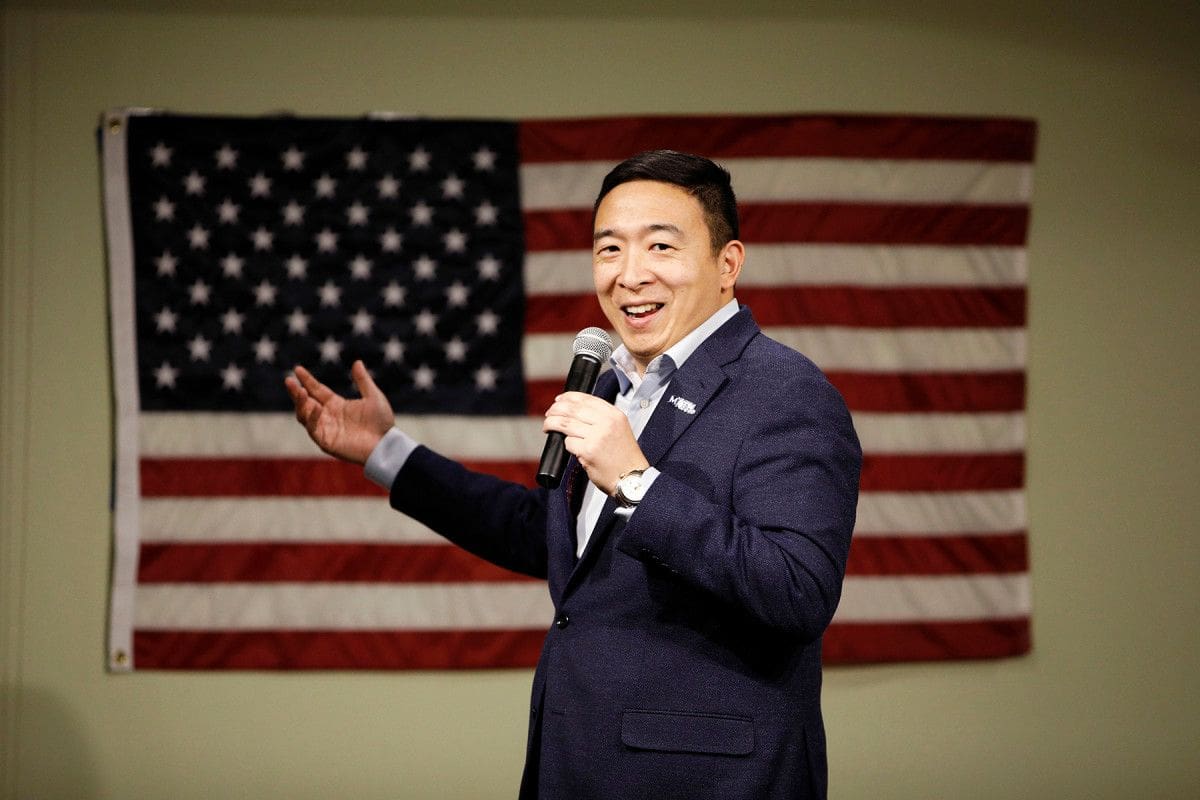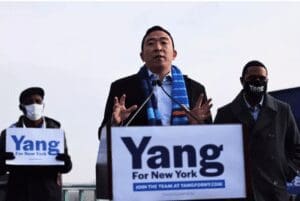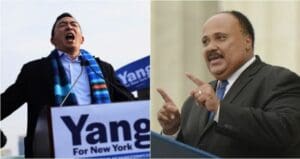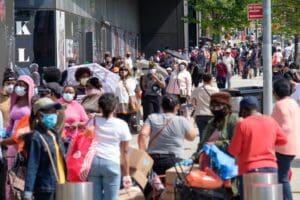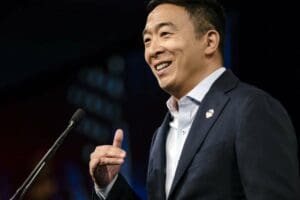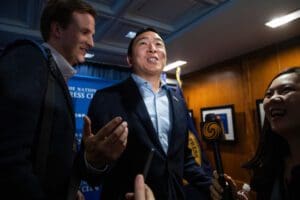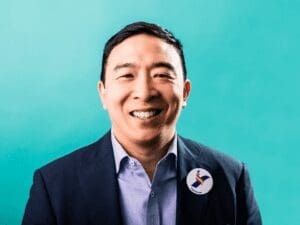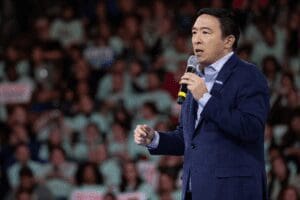In an interview with Rolling Stone, Yang says he’s spoken with Democratic leaders about a basic income plan to respond to the new coronavirus pandemic
WASHINGTON — Andrew Yang has dropped out of the Democratic presidential primary, but his signature plan to give every American adult a $1,000 a month has never been more popular.
With the novel coronavirus likely to plunge the economy into a recession and decimate the livelihoods of people who own small businesses or work in jobs without a guaranteed salary, lawmakers across the political spectrum have come out in favor of direct cash payments as a response to the pandemic. Reps. Alexandria Ocasio-Cortez (D-N.Y.) and Tulsi Gabbard (D-HI) as well as Sen. Mitt Romney (R-Utah) have all called for some version of a basic income to deal with the economic fallout from the pandemic. One proposal by Reps. Tim Ryan (D-Ohio) and Ro Khanna (D-Calif.) would directly pay affected Americans up to $6,000 a month depending on their need; Romney’s announcement calls for a flat $1,000 for every adult.
Yang says he’s heartened to see elected officials embrace his signature idea in the middle of the coronavirus. He says he’s had informal conversations with Democratic leaders on Capitol Hill about a universal basic income plan, and the organization he launched after dropping out of the presidential race, Humanity Forward, has also interacted with policymakers. “It’s invigorating that we might actually pass this thing before people’s lives fall apart,” he says.
Yang spoke with Rolling Stone on Monday afternoon about why a basic income could keep many Americans afloat right now, what type of plan he’d implement if he were president, and whether he plans to run for office again in the future.
This interview has been lightly edited for clarity.
Rolling Stone: Why do you think UBI is the right response to the COVID-19 pandemic?
Andrew Yang: Think about the millions of Americans who work in jobs that are going to be impacted negatively and the list is essentially endless — from Uber drivers and waitresses and airline attendants to hotel workers and dog walkers and personal trainers. You’re going to have many, many Americans have their income reduced or wiped out in the days to come.
The CDC just said we should avoid gatherings of 50-plus for two months. New York City just shut down all of its bars and restaurants. The economic ripple effects are devastating and pervasive.
And so you have to look up and say, ‘How the heck do you try to keep millions of Americans of families afloat in that situation?’ We already had record levels of financial precariousness before the crisis: Almost half of Americans said they couldn’t afford an unexpected $400 bill, and 78% are living paycheck to paycheck. So what do you do?
In the absence of some kind of drastic move, you would see massive contraction in demand and economic activity to a point where you could be staring at a historic depression. So given that backdrop, you have no choice but to take drastic measures to help support demand and keep American families above water, and there’s no realistic way to do that except just to put cash in everyone’s hands as fast as possible.
If you were president right now, how would you design a coronavirus-specific basic income relief plan?
I would do a flat $1,000 per individual adult and then $500 per child under 18 and do it for three months. I like the earned income tax credit, but it doesn’t capture everyone that it would need to, and you don’t have much time in this kind of crisis. The downsides of being under-inclusive are high, so you’d want to err on the side of completeness if you can. Just say, ‘Look, if you’re an adult you get $1,000, and for every child you get an additional $500.’ That would secure more people’s ability to weather this storm.
What have you heard from people affected by this pandemic?
People from every ideological background have come out and said it has to be cash. I’m thrilled that everyone has drawn the correct conclusion, because they’re right. It does give me a sense of accomplishment that many times when someone refers to giving people cash, my name gets mentioned. So that’s something I’m really proud of. I think I may have helped prepare the country to have the most effective solution right on hand as this crisis hits.
When was the last time both AOC and Mitt Romney were in unison on a major policy idea?
I think it’s a first. It’s a thrill that you have people at every point in the political spectrum coming together and trying to solve the problem in a rational apolitical way.
Has anyone in Congress reached out to you or your team for designing that sort of package?
My team has had people reach out. I’ve had some informal contact. I’m in touch with the Democratic leadership. I’m going on CNN tonight to talk about it. My organization, Humanity Forward, is working on things to push it along. I’m pulling every lever.
You were critical of the Federal Reserve’s decision to drop interest rates to zero. Why?
Let’s say that I’m a waitress and the restaurant I work in closes because of COVID-19. What does having zero interest loans do for me? Am I supposed to go to a bank and borrow money? That doesn’t really help me. That’s true for businesses and workers and most parts of the economy. If I’m a small business, I’m also not going to run out and get a loan in all likelihood. The people that have access to capital are businesses that typically have millions or tens of millions of dollars of revenue or up. The average worker is not going to be touched by a drop in interest rates and the average small business probably won’t be either.
Are there existing models or test cases elsewhere right now for the type of universal basic income you’re calling for?
The Alaska petroleum dividend is one data point where it’s been wildly popular for decades. But one thing that is right here and close to home is that there are certain Indian tribes that have dispensed dividends from casino money to families for years, and you’ve consistently seen really significant improvement in health and education and mental health and domestic violence levels in those situations when you look at groups that have gotten the money and not gotten it. Right now ,we’re in a crisis and we need to do this, to put money into poor people’s hands. I’ve been championing this because it would help any community, crisis or not.
Should we worry about paying for this kind of UBI relief plan?
Mitt Romney is a very experienced businessman. He knows what the consequences would be of an economic collapse. What price tag would you put on an economic and societal collapse?
What Mitt also knows is that if you put money into people’s hands it’s going to go straight into buying toilet paper and food and Netflix and circulate through the economy in myriad ways. The money doesn’t disappear; it gets spent in the economy. You’re going to get that money back probably as a multiplier effect. The trickle-up economy is real.
Last question: Are you still thinking about a future run for office? You’ve mentioned a bid for New York City mayor.
We’re looking at that as a possibility, but right now my focus is on making sure we pass this $1,000-per-person emergency measure. I’m doing everything I can to push that in the right direction. It’s all hands on deck right now.











